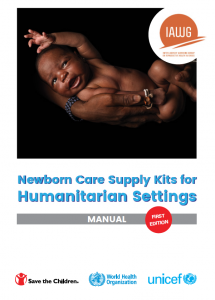
The neonatal period (from birth to 28 days) marks one of the most vulnerable periods in the life cycle. Globally, an estimated 2.7 million babies die within the first month of life every year, and another 2.6 million babies are stillborn. In conflict and emergency settings, the vulnerabilities of newborns increase while access to services decreases.
As a result, the highest neonatal mortality rates are found in countries that have recently experienced a humanitarian crisis. Though important gains have been made in addressing sexual and reproductive health in humanitarian settings since the International Conference on Population and Development in Cairo in 1994, further attention is needed to ensure newborn needs are sufficiently and systematically addressed from the onset of a crisis response. Newborns everywhere have a right to this care.
The Inter-agency Field Manual on Sexual and Reproductive Health in Humanitarian Settings (IAFM), originally published in 1999 and revised in 2010 and 2017, is the primary guidance document outlining sexual and reproductive health service provision, including maternal and newborn health, in a crisis response. It articulates the minimum standard in humanitarian sexual and reproductive health service provision, the Minimum Initial Service Package (MISP). The MISP details the life-saving activities, services, equipment, and drugs that health actors should prioritize in an acute emergency response. To support rapid implementation of the MISP, pre-packaged kits—The Inter-agency Reproductive Health Kits (RH Kits)—are available from UNFPA.
To provide more detailed guidance on newborn care in emergencies, The Newborn Health in Humanitarian Settings: Field Guide (Field Guide) was developed to complement the IAFM. The Field Guide serves as a program management and advocacy tool rather than a clinical guide. To complement the RH Kits, which do not provide the full range of supplies, equipment and drugs to support implementation of priority newborn care services, the Newborn Supply Kits for Humanitarian Settings (Newborn Kits) were developed.